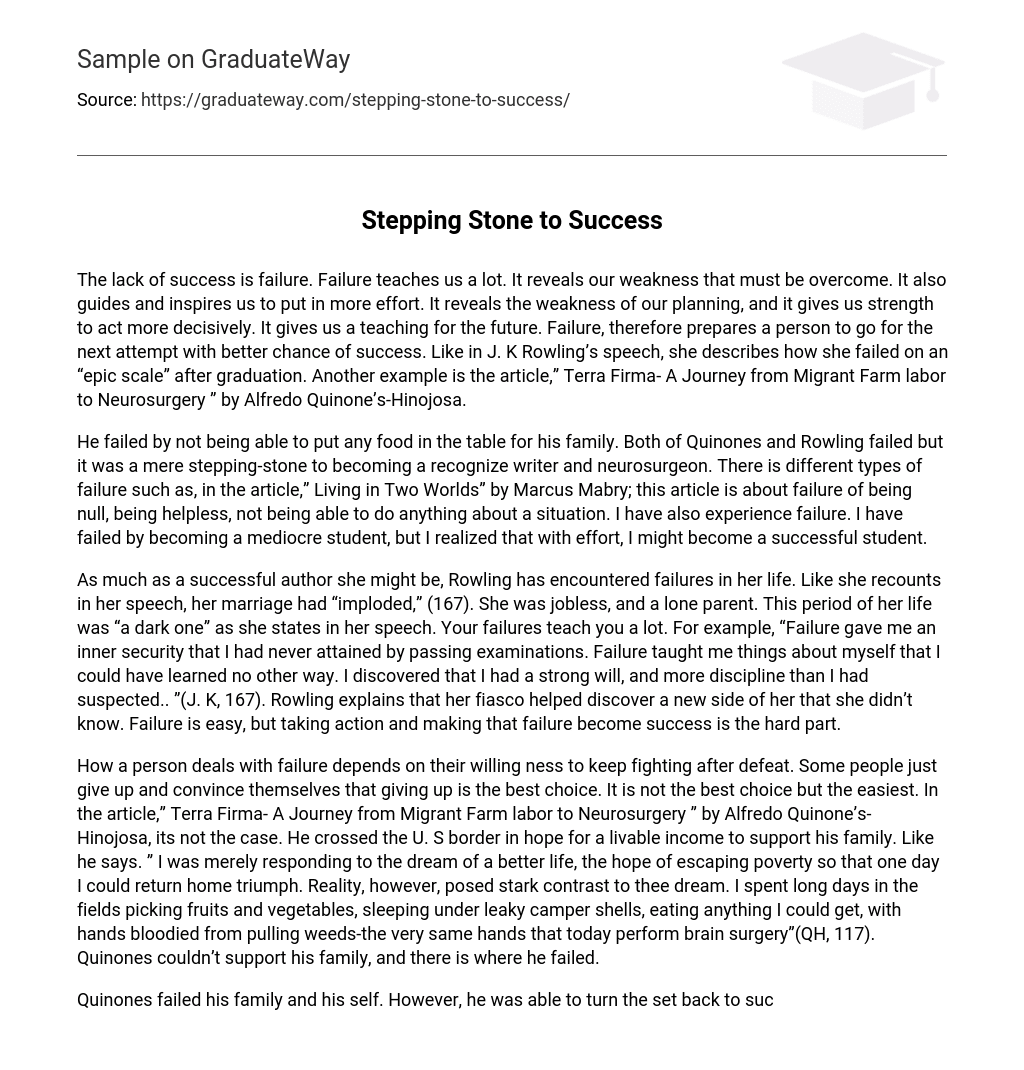Failure is not just a lack of success, but it also functions as a significant educator. Through failure, we acquire insights into our weaknesses and the importance of overcoming them. It offers guidance and motivation to exert more effort while highlighting flaws in our planning, enabling us to take more decisive actions. By experiencing failure, we develop the strength and knowledge necessary for future endeavors. J.K Rowling’s speech on her own “epic scale” failures after graduation exemplifies this concept. Similarly, Alfredo Quinone’s-Hinojosa discusses this idea in his article “Terra Firma- A Journey from Migrant Farm labor to Neurosurgery.”
Both Quinones and Rowling encountered failure in their respective careers, but these setbacks ultimately propelled them towards becoming acknowledged writers and neurosurgeons. In Marcus Mabry’s article “Living in Two Worlds,” various forms of failure are examined, including the sensation of helplessness and the inability to take action in a given situation. Personally, I have also faced failure as a mediocre student. Nevertheless, I have come to recognize that through exertion and commitment, I possess the potential to transform into a triumphant student.
Despite her success as an author, Rowling has faced setbacks in her personal life. In her speech, she opens up about the collapse of her marriage which left her jobless and single-handedly raising her child. She refers to this period as a “dark one.” However, Rowling stresses the valuable lessons that can be learned from failure. She explains that through failure, she gained a sense of inner security and discovered aspects of herself that would have otherwise remained unknown. Her difficult experience led to newfound strength and discipline. Rowling’s story highlights the idea that encountering failure is easy, but the real challenge lies in taking action and turning failure into success.
The manner in which an individual handles failure is influenced by their determination to continue striving after experiencing defeat. Certain individuals may simply give up and convince themselves that surrendering is the optimal choice, even though it is not the best option but rather the simplest. This is not the case in Alfredo Quinones-Hinojosa’s article, “Terra Firma- A Journey from Migrant Farm labor to Neurosurgery.” Quinones-Hinojosa immigrated across the U.S border with aspirations of obtaining a sustainable income to provide for his family. As he states, “I was merely responding to the dream of a better life, the hope of escaping poverty so that one day I could return home triumph. Reality, however, posed stark contrast to the dream. I spent long days in the fields picking fruits and vegetables, sleeping under leaky camper shells, eating anything I could get, with hands bloodied from pulling weeds-the very same hands that today perform brain surgery” (QH, 117). Quinones-Hinojosa was unable to financially support his family, and therein lies his failure.
Quinones’s failure not only affected his family but himself as well. However, he was able to overcome this setback and achieve success. As Quinones himself mentions, “From the fields of San Joaquin Valley in California to the field of neurosurgery, it has been quite a journey” (QH, 119). This failure served as a stepping-stone that propelled him towards a new chapter of greatness. Just as Rowling emphasizes, experiencing setbacks allows one to grow wiser and stronger, providing the knowledge that they can survive any challenge. It is through adversity that one truly discovers oneself and the strength of their relationships.
Such knowledge is a true gift, despite the pain it takes to acquire, and it has proven more valuable than any qualification I have earned. (J. K, 167). Quinones’ story exemplifies what Rowling is saying. He went from being an immigrant farm worker and railroad welder to becoming a Neurosurgeon. The challenges he faced made him stronger and aided him in achieving his dream of a better life. Rowling’s failure is different from Marcus Mabry’s failure. In Marcus Mabry’s article “Living in Two Worlds,” his failure lies in not being able to help his family.
Mabry describes his experience of moving between two contrasting worlds, transitioning from a wealthy environment to a poor one. In his own words, he expresses, “Once I returned home to New Jersey, reality hit me. Instead of being surrounded by privileged freshmen, I found myself surrounded by unemployed relatives. The demanding professors were replaced by hard-working single mothers, and the comfortable classrooms were exchanged for run-down bedrooms and kitchens” (M. M, 110). Mabry experiences a deep sense of remorse upon returning home. He feels helpless as he witnesses his family’s struggles while he leads a successful life. This type of failure is particularly harsh as it leaves him feeling empty and incapable of providing assistance.
In my life, I have also experienced failure. I failed myself by not reaching my full potential and neglecting to set goals. My sole focus was graduating from high school without any other ambitions. I went through each day until graduation without direction. In school, I consistently fell short of achieving an A grade and realized that with more effort, I could have obtained better grades. Now in college, I feel similar to how I felt in high school but am slowly becoming stronger. Failure is the absence of success and is inevitable in life unless you live so cautiously that you fail by default (J.K., 167). As Rowling suggests, it is up to you to embrace failure and learn from it. Like Rowling, Quinones, and Mabry, they serve as examples of individuals who learned from setbacks and gained confidence by overcoming challenges – setbacks were stepping stones on the path to success.





